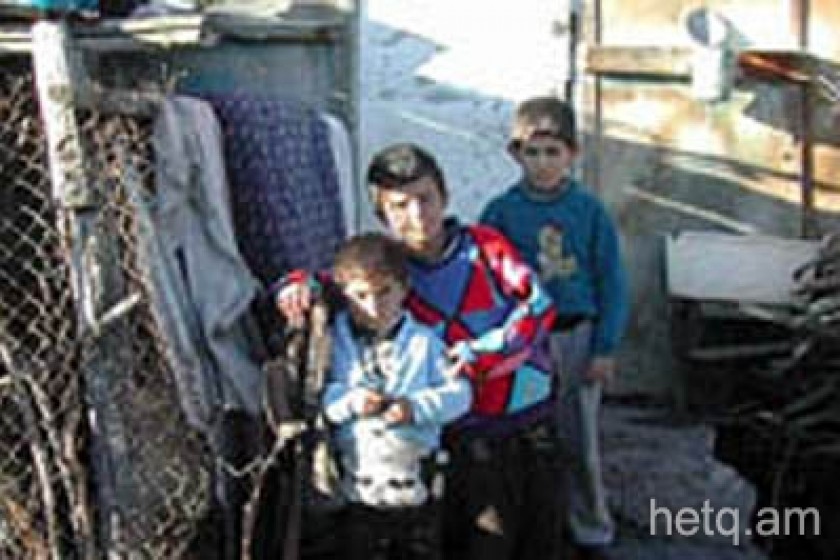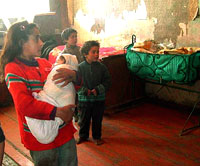
Features of poverty
For thirteen years now refugees have resided in Vardenis temporarily
Elmira Nasibian settled in the village of Geghakar in the Vardenis district in 1989. Today the unmarried woman represents a horror to the neighborhood. Fellow-villagers say that she is moving for the third time now. In winter, because she didn't have fuel, she demolished all the wooden parts of her house and burnt them up, and with all this going on she astonished everybody with her skill in removing beams from the roof, the last of which she keeps under her bed.
The other villagers were alarmed when she recently took advantage of one neighbor's absence, and burnt up the door of his house. The danger of the roof's collapse threatens to force Nasibian to move for the third time-- she sleeps almost in the open air. Vahagn Hakobian, the Marzpet (governor) of Gegharkunik, fulfilled the request made by Levon Nercessian, Chairman of the Sakharov Armenian Center for Human Rights, to provide Geghakar resident Elmira Nasibian with housing and to find her a job. "I will never leave this place", she insisted, astonishing everybody. On the surface, the explanation for this is apparently that she does not want to leave because the community wants her to desperately. In reality, however, the reasons for her not leaving are deeper. Over those years she has declined both financial and food assistance from the Sakharov Center.
The refugees took up residence in Vardenis thirteen years ago. They were settled in the abandoned houses in the village communities without any official registration. "When they were settled here they were told that this was a temporary arrangement, but for thirteen years now they have resided here temporarily. They are still guided by the Soviet mentality, they say-let the state build me a house and I'll live in it. They are not used to creating anything on their own, they're stuck in a complaining mode; we too have taught them to beg, "spoiled" them, and now it is very hard to change them", says Levon Nasibian.
Marzpet Vahagn Hakobian told us that there are 600-700 families living in abject poverty, a large number of whom are refugees. "Refugees reside in 30 villages of the marz (region), and all of them come from urban areas. The population was settled in the villages; the young people have left, and the elderly, the women and the children have remained a burden to the state. It his very hard to take care of the elderly and the children, especially when the country lifestyle is alien to them. I told the refugees in the village of Aghbet to make use of the lake, but they do not know how to fish. A great many of them have reached a state when all they have left is the hope of pensions and allowances. They have land but they do not cultivate it, there are people who still have the attitude that they are about to move on," says the Marzpet.
One of the last three families of refugees settled in Kartchaghbyur left the village in those days - they bought a house in the town of Abovian and moved. Two other families continue to live side by side, in dilapidated dwellings, without sanitary arrangements. The Chairman of the Sakharov Center offered one of them, a middle-aged man, a cottage built for refugees, but he refused - he was probably tired of endless migration.
The road to Geghakar is closed by the first snowfall
The villagers told us that in summer too one must go through many trials to reach Geghakar. But before the road had been closed by the first snowfall, the residents of Geghakar went on foot to the neighboring village of Khachaghbyur to express their indignation to the inspector of the electricity supply network. "Last week they came to register the electricity payments and presented us with round numbers without even glancing at the electricity meters. Several villagers' electricity was cut off", they said. They also told us that the inspector from the neighboring village had always preferred his accurate eye to any other unit of measurement.
Paid for with funds obtained by the Sakharov Center, one building was renovated, or rather a new school was built, which, in its contemporary appearance, differs from any other building in the village. The schoolhouse has not yet opened, and school-aged children continue to attend classes in the old dilapidated building whose cracks get wider with every passing day because of blasting in the nearby quarry. It is hard to say how crucial it is for them to have a new school. The Chairman of the Sakharov Center said that two years ago they visited village after village with the New Generation NGO and found out that in three villages alone there were about 400 children not attending schools. "They were all of school age, 11-12 years old, but they had not gone to the fist grade. We wanted to open a boarding school for four months, so that afterwards they could continue their education, but we could not".
To our question "How many children do not attend school?" the Gegarkunik marzpet responded: "According to our information, seven children, two of whom are retarded". Levon Nersissian interrupts the conversation: "The school administration, for various reasons, does not provide us with real numbers of those not attending school. They all are registered in the schools but do not in fact attend classes for the following reasons:
1. Mountainous villages are provided with the same financing for heating the schools as cities are, but here the temperature falls to minus 20 degrees centigrade.
2. On the other hand, children do not attend classes or attend seasonally. This is because of the villagers' mentality - it is not necessary that a child be able to read or write, it is better that he or she look after the animals than go to school.
There are refugees who take their children out of school after the fourth grade, to look after the sheep. The reason is social - they are hungry, half-naked, but if you give them food they will sell it, if you give them shoes it is unclear whether they will wear them or sell them. Some do this to get drunk, others to pay for electricity or to meet other needs. At the turn of the year, they are told that they have big debts. There are families that have not had electricity for two years. In order to alleviate conditions of the extremely poor families, an organization from the Netherlands, at the mediation of the Sakharov Center, have offered to shelter 20 children from the poor families of the villages of Vardenis and Tchambarak for one month-- they will stay with Dutch families.
A mother of ten is deprived of medical assistance
 Saribek Mikayelian is a native of the Vanevan village of Vardenis. He is a father of ten, the youngest of whom is three months old. After giving birth to their last child, his wife Rita suffered a blood-vessel blockage, and was transported to the Republican hospital in Yerevan in grave condition. She stayed in the hospital for fifteen days and was discharged. Now she is confined to bed without medical assistance. With her prescription on the windowsill, she explains what it says to visitors, in the hope that somebody can be of help in this matter. They cannot say how they are fed. "We have a half-sick cow, we sold the calf for 30,000 Drams to pay off the hospital for the medicine". Doctors prohibited breast-feeding the baby and they give it cow's milk, which is harmful for a three-month old.
Saribek Mikayelian is a native of the Vanevan village of Vardenis. He is a father of ten, the youngest of whom is three months old. After giving birth to their last child, his wife Rita suffered a blood-vessel blockage, and was transported to the Republican hospital in Yerevan in grave condition. She stayed in the hospital for fifteen days and was discharged. Now she is confined to bed without medical assistance. With her prescription on the windowsill, she explains what it says to visitors, in the hope that somebody can be of help in this matter. They cannot say how they are fed. "We have a half-sick cow, we sold the calf for 30,000 Drams to pay off the hospital for the medicine". Doctors prohibited breast-feeding the baby and they give it cow's milk, which is harmful for a three-month old.
The family gets a social allowance, however, as the Marzpet says, it does not solve their problems. "We pay four or five thousand Drams for electricity and with the rest we buy sugar and bread", says the mother of ten. Nevertheless, on the threshold of winter, the family is busy stocking up. In the hallway of the house there were a couple of bags of potatoes, the father of the family's pay for work done in fellow villagers' fields, in accordance with the "food for work" formula. The marzpet's office demonstrated its assistance to families with many children by providing 200 kilogram of wheat. But strangely, their electricity debt continues to grow and has reached 35,000 Drams, even though the house is heated only with dung.
According to Rita Mikayelian, only two of her five school-aged children do not attend school, because they do not have clothes. One of them should be in second grade and the other in first. "Two of this family's ten children attend classes, and not regularly", the Center's representatives correct her.
 Videos
Videos Photos
Photos




Write a comment